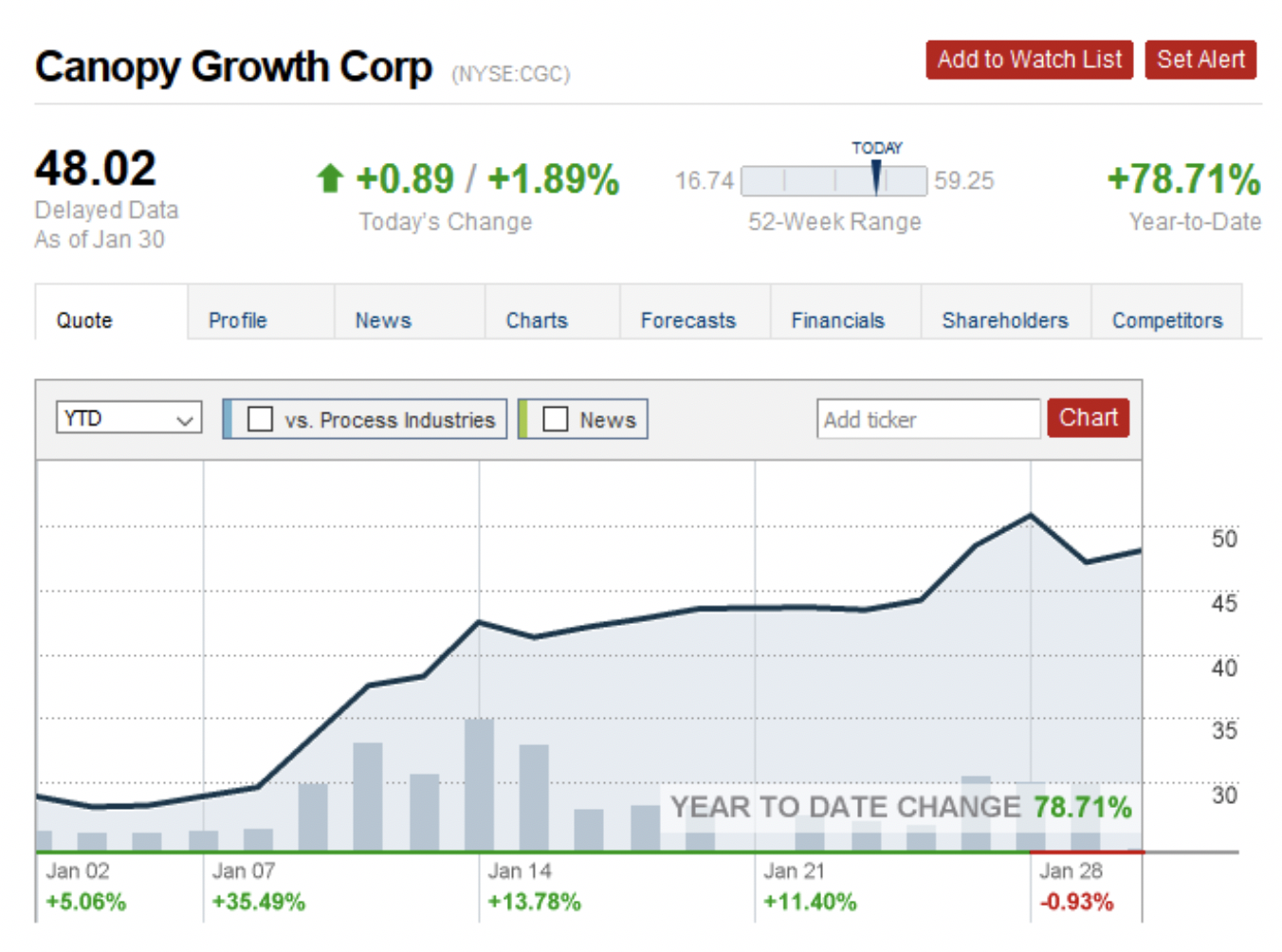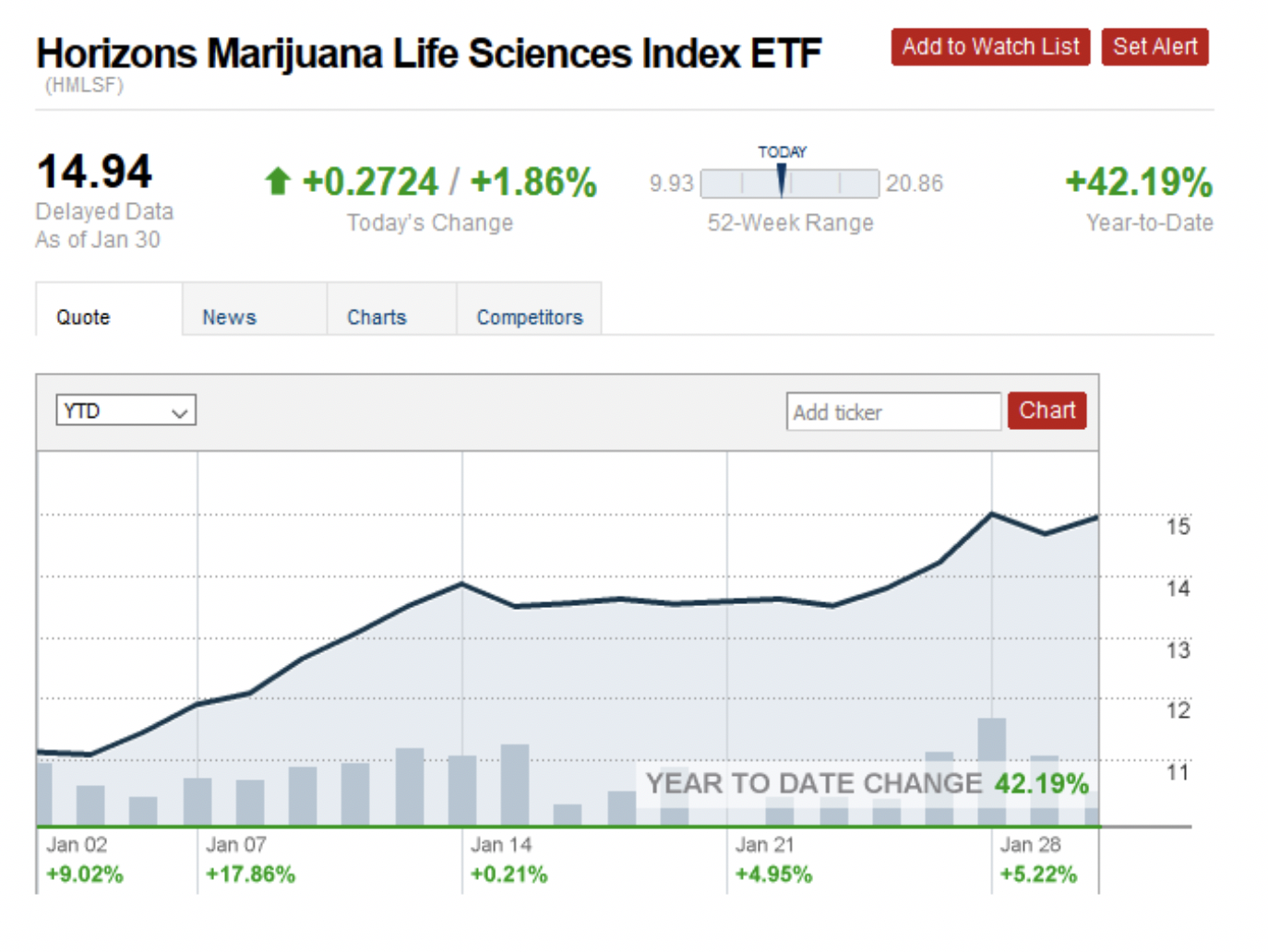What’s in a name? Or precisely, what’s in a ticker symbol? Apparently, everything. Or at least that’s what Canadian weed companies seem to think as they wage an all-out war for bragging rights to be identified with the eponymous ‘POT’ ticker symbol.
The POT symbol is up for grabs after the company that previously held it, Potash Corp. of Saskatchewan, merged with Agrium Inc. to create a new company, Nutrien Ltd. Demand for the ticker is so high that weed companies have agreed to hold a lottery to determine who gets it—the first time ever things are going down to the wire this way.
The lottery is free and will be open to all companies listed on Canadian exchanges, with the ticker becoming available for reservation on Feb. 1. ETF and companies with no operating businesses are not welcome. POT will join other ‘cool’ marijuana ticker symbols such as MJ and WEED in the cannabis lexicon.
Before you dismiss the exercise as just another case of misplaced lexicological zeal, read on…
Do ticker symbols really matter?
More importantly, can an interesting stock symbol move markets?
Evidence suggests that even complex financial markets are not immune to a little goofiness and idiosyncrasy. A 2016 study published in the Journal of Financial Markets found that the likeability and even pronounceability of a ticker symbol are positively correlated to a stock’s value. In other words, having a fun, cute, sexy or clever ticker like LUV, HOG, WEED, MJ, BEN, BUD, HACK, FAN, GRR and so on can have a tangible effect on how the market perceives and values you.
In the study, the researchers asked undergrad business students to rank ticker symbols by 1,959 publicly-traded companies based on how much they liked them and how easy there were to pronounce. The paper found that valuations of companies with likable ticker symbols like ACE (Acesite Philippines Hotel Corp.), BRO (Brown and Brown, Inc.) and LUV (Southwest Airlines) were about 1.3 percentage points higher than valuations of companies with the least-liked handles such as JWN (Nordstrom Inc.) and CFW (Calfrac Well Services Ltd). Related: Automakers Go All-In On Electric Vehicles
At first glance, a 1.3-percent point difference might not seem like much to quibble over. But for a pot com like Canopy Growth Corp. (NYSE:CGC) currently valued at $11.4B, that works out to a cool $148.2 million. Maybe the fact that Canopy Growth trades by the sexy ticker symbol ‘WEED’ in Canada is partly responsible for the popularity of the company and its astonishing 78 percent rally in the year-to-date.

(Click to enlarge)
Source: CNN Money
Xuejing Xing, associate professor of finance at the University of Alabama and co-author of the study says that a likable ticker is associated with greater liquidity since such stocks tend to be more heavily traded than their less likable peers. He also points out that the higher valuation could be the result of mispricing whereby investors unconsciously assigns higher values to symbols that are easier to pronounce. In some cases, recognizable tickers such as BUD, IBM, MSFT, AAPL, GOOG and others that are closely related to their company names also tend to be highly rated.
Trump gives cannabis companies a lifeline
Xing extolls companies pushing for a public listing to be aware of these innate market biases. But short of taking a random sample of companies and changing their tickers to likable or unlikeable ones then observing how the market responds, the study is likely to remain inconclusive and may be of dubious value from an investment standpoint.
Related: Russia’s Post-Soviet Calendar Boy
For all it’s worth, having a stodgy ticker has not stopped the Horizons Life Sciences Marijuana Index ETF (OTC:HMLSF) from being one of the best-performing so far in the current year. HMLSF is up 42.2 percent YTD vs. 7 percent by the S&P 500 ETF (SPY).

(Click to enlarge)
Source: CNN Money
This year’s turnaround in fortunes comes in the wake of last year’s mauling after the sector finished 55 percent lower following the 2017 bubble burst.
The industry has president Trump’s 2018 Farm Bill to thank for the renaissance. The bill separated hemp from the legal definition of marijuana and thus opened up new possibilities for non-psychoactive cannabidiol ("CBD"), a compound that can be derived from hemp. CBD is regarded as a highly marketable product with various possible medical benefits including control of chronic pain and depression. The 2018 Farm Bill also removed all cannabis fiber products with less than 0.3 THC from the Controlled Substances Act.
In effect, what the new bill does is that it makes it legal to manufacture, distribute and sell hemp-derived CBD products anywhere in the United States. Canaccord Genuity recommends the stocks below as being best-poised to take advantage of the new bill:
-Canopy Growth Corporation (WEED-TSE | SPECULATIVE BUY; C$50.00 PT)
-Charlotte's Web Holdings, Inc. (CWEB-CSE | BUY; C$21.00 PT)
-Curaleaf Holdings, Inc. (CURA-CSE | SPECULATIVE BUY; C$13.00 PT)
-1933 Industries, Inc. (TGIF-CSE | SPECULATIVE BUY, C$0.70 PT)
-Liberty Health Sciences Inc. (LHS-CSE | SPECULATIVE BUY, C$2.00 PT)
-DionyMed Brands, Inc. (DYME-CSE | SPECULATIVE BUY, C$5.50 PT)
-KushCo. Holdings, Inc. (KSHB-OTC | SPECULATIVE BUY, US$7.50 PT)
-MJardin Group, Inc. (MJAR-CSE | SPECULATIVE BUY, C$9.00 PT)
It’s important to note that some legal ambiguities still remain even after passing of the farm bill. To wit, the FDA has maintained its earlier stance that it’s unlawful to sell CBD as a dietary supplement. Canaccord's North American equity research team though says that the confusion is likely only transient and mass-market retailers are likely to start distributing CBD products over the course of 2019.
By Alex Kimani for Safehaven.com
More Top Reads From Safehaven.com
















